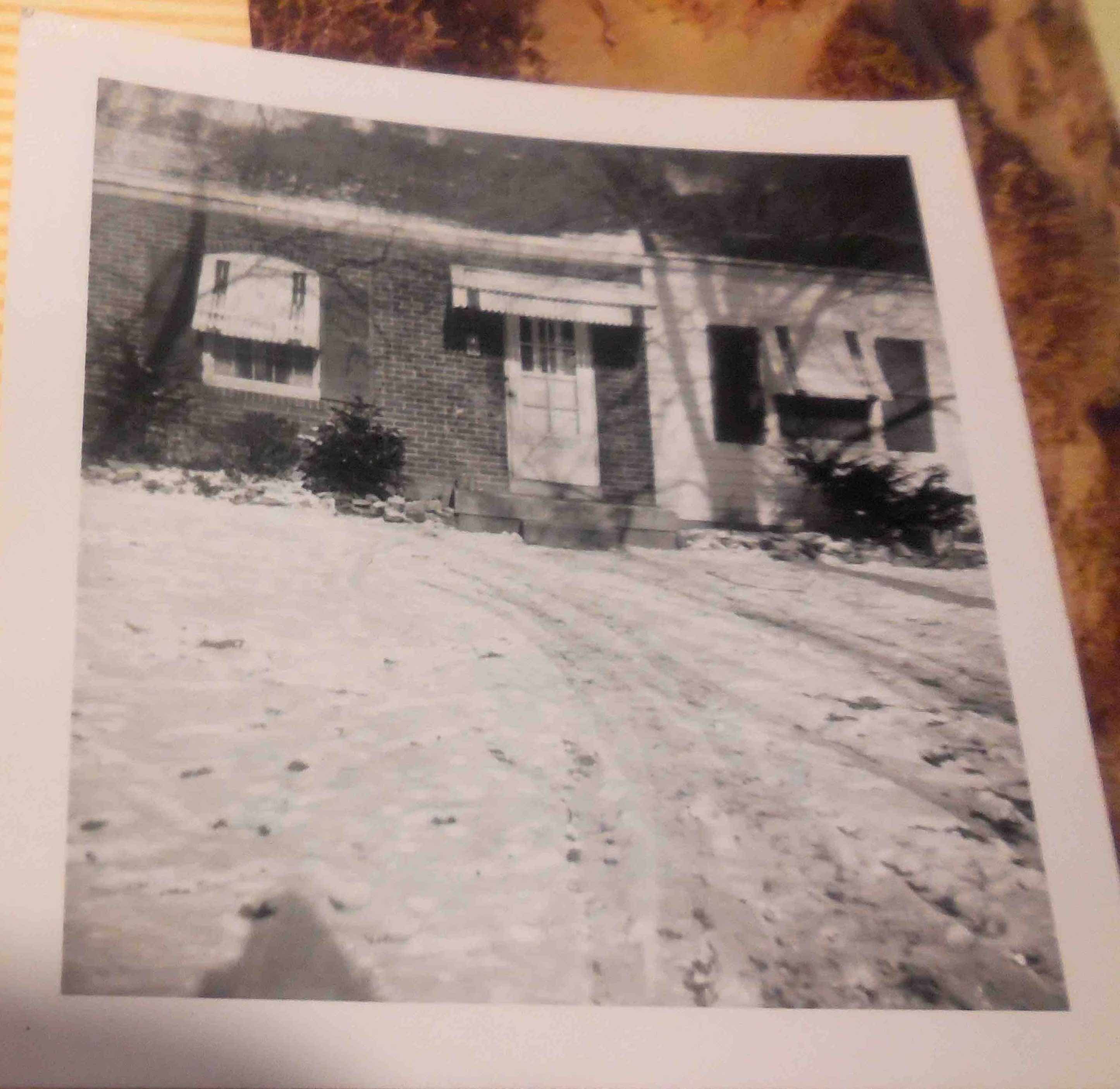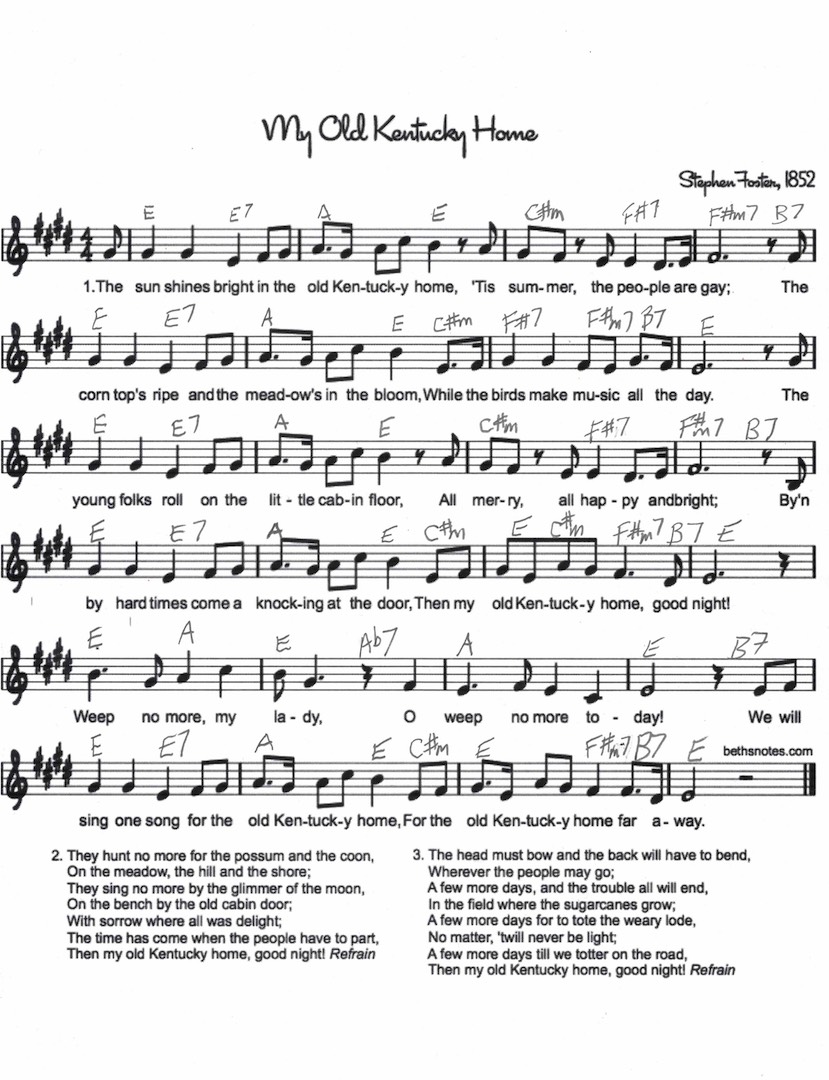5. Dos cuentos de
mi madre sobre canciones
Hace poco mi hermana dijo que creía que "Old
Black Joe" era una de las canciones más bellas
que nunca había sido escrita. Yo estaba de
acuerdo y al reflexionar sobre esto, dos cosas
se me ocurren. La primera es que cuando yo era
un niño mi madre me contó una historia sobre
como fue compuesta esa canción. La segunda
trata del autor de la canción, Stephen Foster.
Resulta que siempre he sentido lo mismo en
cuanto a otras dos canciones suyas: "My Old
Kentucky Home" y "Old Folks at Home" (Ya
sabes—"Swanee River.")
Weep no more, my
lady
No llores más mi dama
Oh, weep no more,
today
Oh, no llores más hoy
We will sing one
song
Cantaremos una canción
For my old Kentucky home De
mi vieja casa de Kentucky
For my old Kentucky home De
mi vieja casa de Kentucky
So far
away
Tan lejos de aquí
El puente de "Old Folks at Home" también evoca
una sensación de melancolía.
Todo el mundo está triste y sombrío
Cualquier lugar a donde vaya
Oh, negros cómo mi corazón se cansa
Lejos de los viejos en casa
A Foster le gustaba componer la letra de sus
canciones en la forma de hablar de los
esclavos del sur de Estados Unidos. El
personaje, el cantante de sus canciones por
regla general, es un esclavo—por lo menos el
oyente supone que sí y el dialecto típicamente
se escribe con "dis" en vez de "this,"
"de" en vez de "the," "wid" en vez de
"with" y así.
Foster, sin embargo, no usó esa forma de
hablar en "Old Black Joe".
Y pasaron los días en los que mi corazón era
joven y alegre,
Se han ido mis amigos de los campos de
algodón,
Ido del mundo a una mejor tierra que conozco,
Escucho sus suaves voces que llaman "Old Black
Joe".
En cualquier caso, la historia que me contó mi
madre fue que Foster solía rondar un
restaurante en el que el camarero negro, Joe,
siempre decía: "Sr. Foster, ¿cuándo va a
escribir una canción para mí, así tendré algo
que cantar cuando sirva a los comensales?"
Foster siempre respondía: "Oh, estoy en vías
de componértela, Joe".
Bueno, un día, según la historia, Foster
escuchó que Joe se estaba muriendo y fue a la
gran casa donde Joe era un sirviente. Encontró
a Joe en su cama muriendo.
—Nunca me escribió esa canción, señor Foster".
—Sí, sí, lo hice —respondió Foster. ¡Acabo de
terminarla!
Según la historia, colocaron un piano en la
recámara y Foster se sentó y cantó la canción
mientras la componía simultáneamente.
—Y así Joe murió feliz —concluyó mi madre.
La historia es probablemente una leyenda; no
la he encontrado en ninguna parte online de
todos modos. Sin embargo, encuentro en
Wikipedia: "El Joe ficticio de Foster fue
inspirado por un esclavo afroamericano en la
casa del suegro de Foster, el Dr. McDowell de
Pittsburgh", y eso en realidad confiere una
cierta veracidad al relato.
El título de este ensayo se refiere a dos
historias y la segunda es simplemente en forma
de una oración que mi madre dijo acerca de la
canción "My Buddy" de Gus Khan. "Oh, esa fue
una famosa canción homosexual de la Segunda
Guerra Mundial", dijo.
Gus Khan (nacido en 1886) escribió varias
canciones famosas y me consta que usted sabe
todas las siguientes:
"Dream a Little Dream of Me"
"It Had to Be You"
"I'll See You in My Dreams"
4Gus Khan
escribió solo la letra de "My Buddy." La
música fue compuesta por Walter Donaldson.
"Charlie My Boy"
"Ain't We Got Fun"
"Makin' Whoopee"
La canción "My Buddy", sin embargo, trata de
dos amigos en la Primera Guerra Mundial y no
en la Segunda. Uno de ellos fallece y el otro
lo extraña. Khan no tenía la intención de
decir que eran homosexuales (¡No es que haya
nada malo en eso!), sino simplemente amigos. A
pesar de esto, letras como "Echo de menos tu
voz, el toque de tu mano" tienen un
inconfundible sentimiento romántico. Y, por
casualidad, la palabra "gay" aparece en la
canción de 1922 mucho antes de que adquiriera
su significado moderno.
Amigos por todos los días gay,
Amigos cuando algo salía mal
Yo espero a través de estos días grises
Echando de menos tu sonrisa y tu canción
Ya que las tres canciones de Foster son de
dominio público, decidí incluir una. Para
sorpresa mía, al preparar la partitura, me di
cuenta de que yo siempre había cantado "Old
Black Joe" en mi propia manera. Espero que yo
no parezca demasiado atrevido al decir que
prefiero mi versión a la de Foster.
Verdaderamente creo que el estribillo es
demasiado corto. Termina de repente.
Así se canta la canción tradicionalmente:

Old Black Joe Spanish.jpg
De niño, yo cantaba la canción con una letra
que aparentemente había compuesto y repetía la
primera linea del estribillo antes de
terminarlo con las palabras Escucho esas
suaves voces llamando al Viejo Negro Joe.
Opino que la canción verdaderamente necesita
estos dieciséis compases.
Yo cantaba la canción de niño así:
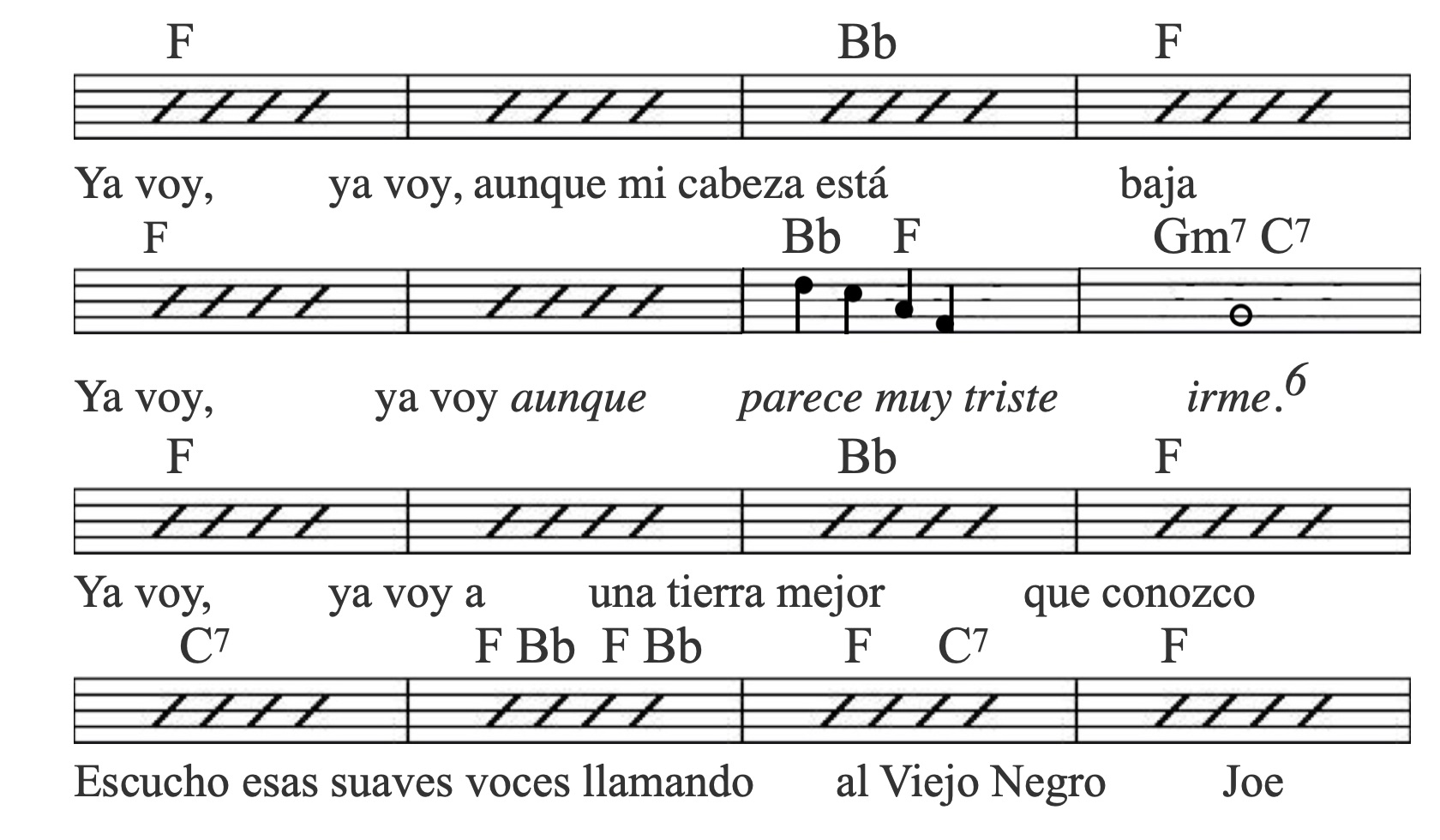
Old Black Joe How I Sing It.jpg
6 La letra
que inventé de niño está arriba en
cursiva. No muy buena pero suficiente.
|
5. Two of my Mom's Stories about Songs
Not long ago my sister said that she believed
that "Old Black Joe" was one of the most
beautiful songs that had ever been written. I
agreed and reflecting upon this now, two
things occur to me. The first is that when I
was a child, my mom told me a story about how
the song was composed. The second has to do
with the author of the song, Stephen Foster.
It happens by chance that I've always felt the
same way about two other Foster songs, "My Old
Kentucky Home" and "Old Folks at Home" (You
know, "Swanee River.")
Just before the Kentucky Derby begins, the
crowd sings "My Old Kentucky Home" and when
they get to the bridge and sing it, there
isn't a dry eye in the stands.
Weep no more, my lady
Oh, weep no more, today
We will sing one song for my old Kentucky home
For my old Kentucky home so far away
The bridge to "Old Folks at Home" evokes a
similar melancholy:
All the world is sad and dreary,
Everywhere I roam.
Oh, darkies, how my heart grows weary,
Far from the old folks at home
Foster liked to compose the lyrics of his
songs in the dialect of slaves in the southern
United States. The character, the singer of a
Foster song, as a rule, was a slave—or the
listener imagines so—and the dialect is
typically written with "dis" for "this," "de"
for "the," "wid" for "with," and so on.
Foster, however, didn't use dialect in "Old
Black Joe."
Gone are the days when my heart was young and
gay,
Gone are my friends from the cotton fields
away,
Gone from the earth to a better land I know,
I hear their gentle voices calling "Old Black
Joe."
Now, the story my mom told me was that Foster
used to frequent a certain restaurant whose
black waiter, Joe, would always say, "Mr.
Foster, when are you going to write a song for
me so I'll have something to sing when I wait
tables?"
Foster always replied, "Oh, I'm working on it,
Joe."
Well, one day, so the story goes, Foster heard
that Joe was dying and he went to the grand
house where Joe was a servant. He found Joe in
his bed dying.
"You never wrote that song for me, Mr.
Foster."
"Yes—yes, I did," Foster answered. "I just
finished it!"
According to the story, a piano was rolled
into the room and Foster sat at it and sang
the song as he simultaneously composed it.
"And so Joe died happy," my mom concluded.
The story is likely apocryphal; I haven't
found it anywhere online anyway. However, I do
find on Wikipedia: "Foster's fictional Joe was
inspired by an African American slave in the
home of Foster's father-in-law, Dr. McDowell
of Pittsburgh," and that actually lends some
plausibility to the tale.
The title of this essay mentions two stories
and the second one is simply in the form of a
sentence my mom said about Gus Khan's song "My
Buddy."
"Oh, that was a famous homosexual World War II
song," she said.
Gus Khan (born 1886) wrote a number of famous
songs and I'm pretty sure that you know all of
the following:
"Dream a Little Dream of Me"
"It Had to Be You"
"I'll See You in My Dreams"
"Charlie My Boy"
3Gus Khan wrote only
the lyrics to "My Buddy." The music was
composed by Walter Donaldson.
"Ain't We Got Fun"
"Makin' Whoopee"
The song "My Buddy," however, is about two
buddies in World War I and not World War II.
One of them gets killed and the other misses
him. It wasn't Khan's intention to say that
they were gay (Not that there's anything wrong
with that!) but simply buddies. Just the same,
lyrics like "Miss your voice, the touch of
your hand" have an unmistakably romantic feel
to them. And, coincidentally, the word "gay"
appears in the 1922 song long before it
acquired its modern meaning.
Buddies through all of the gay days,
Buddies when something went wrong,
I wait alone through the gray days.
Missing your smile and your song.
Since Foster's three songs are in the public
domain, I decided to include one of them here
and to my surprise, as I prepared the music, I
realized that I had always sung "Old Black
Joe" in my own way. I hope that I don't seem
too bold to say that I prefer my version to
Foster's. I really believe that the
bridge/chorus is too short. It ends too
soon—too abruptly. You can decide whether you
agree with me or not.
This is how the song is traditionally sung:
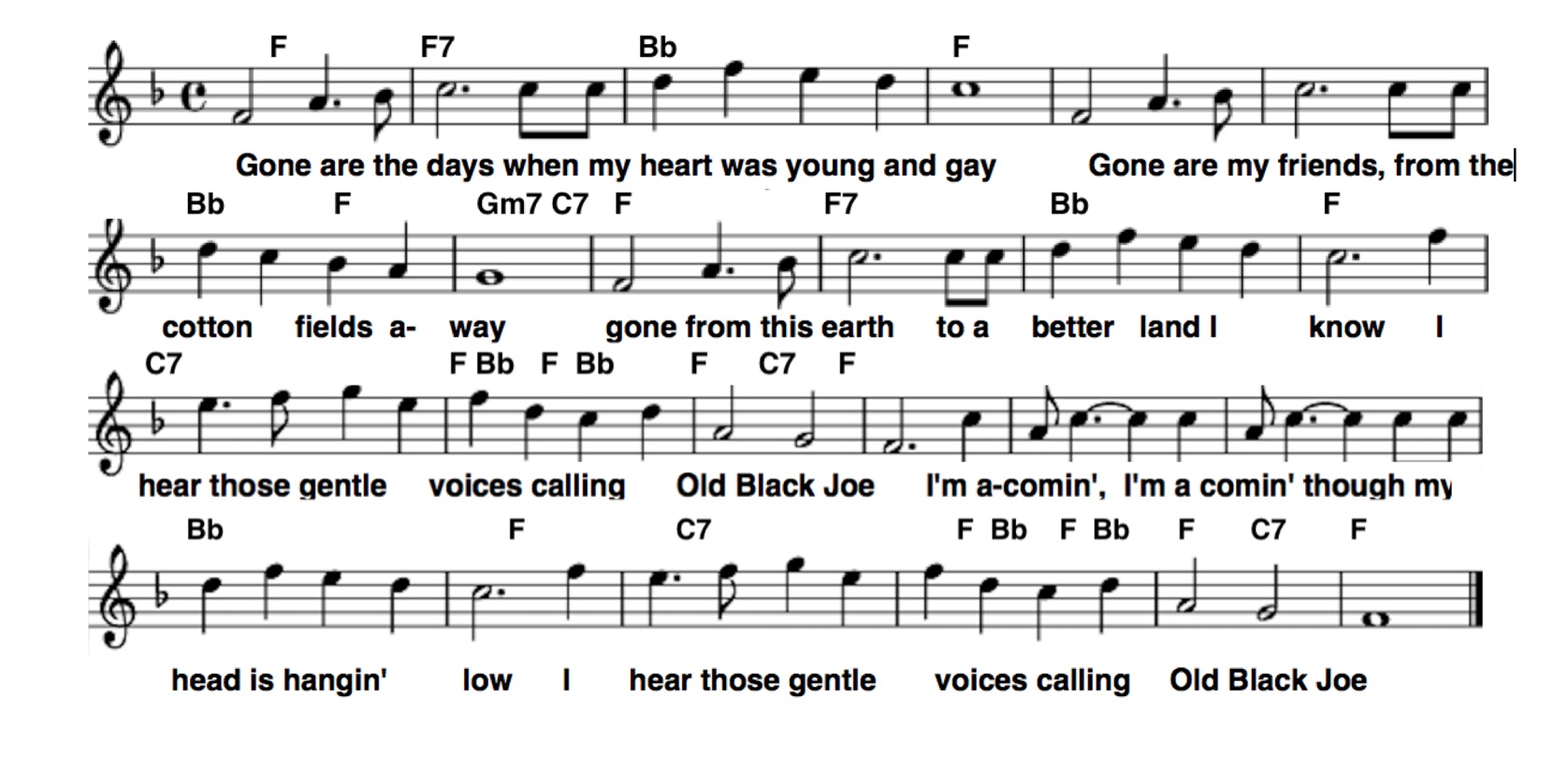
Old Black Joe English.jpg
As a child I sang the song with words that I
had apparently made up and I repeated the
first line of the chorus before ending with
the words, I hear those gentle voices
calling...
I think the song really needs these sixteen
measures.
Here's how I sang the song as a kid and still
do.
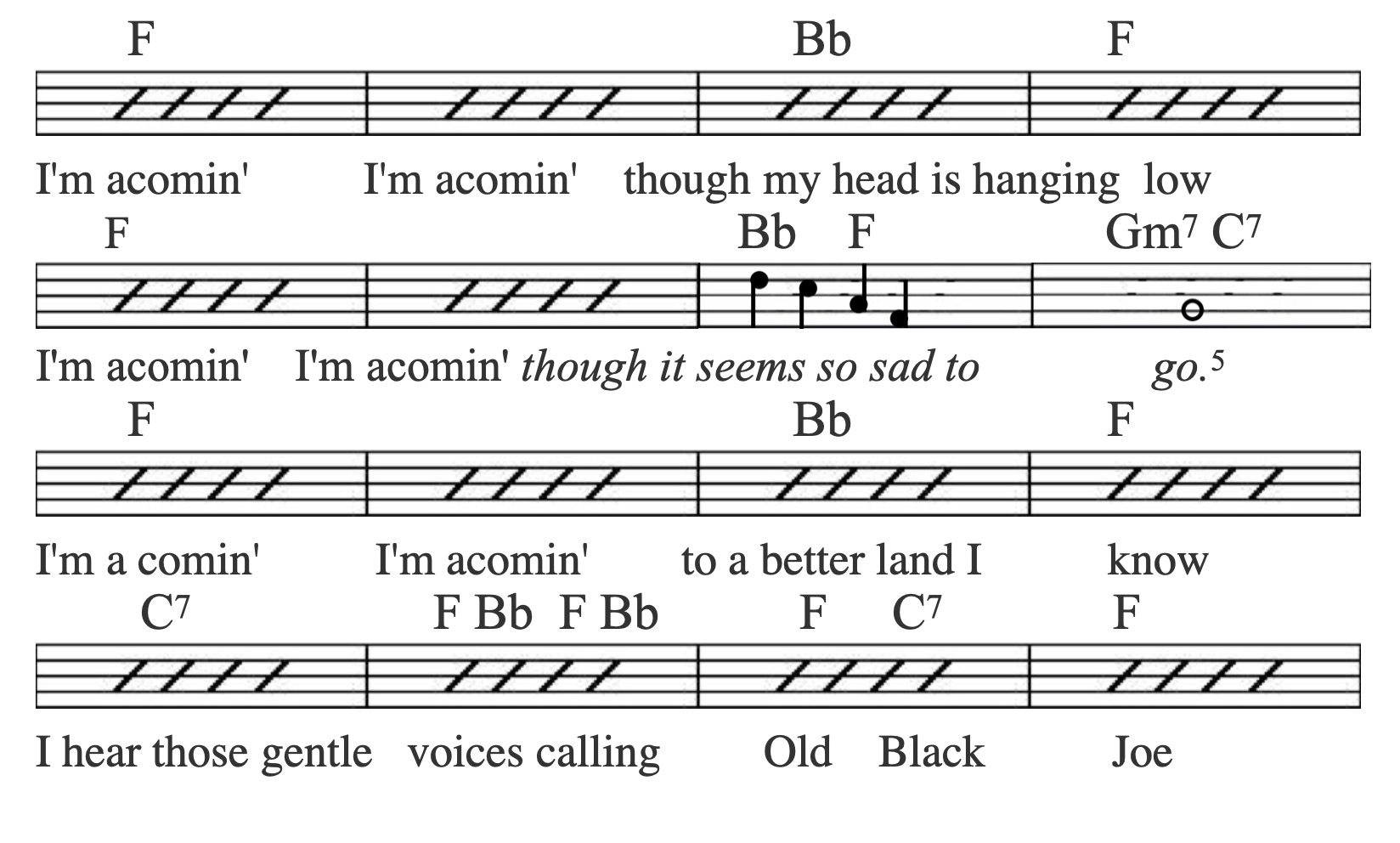
Old Black Joe How I Sing It 2.jpg
5The words I
made up as a child are in italics above.
Not too great, but they suffice.
|
